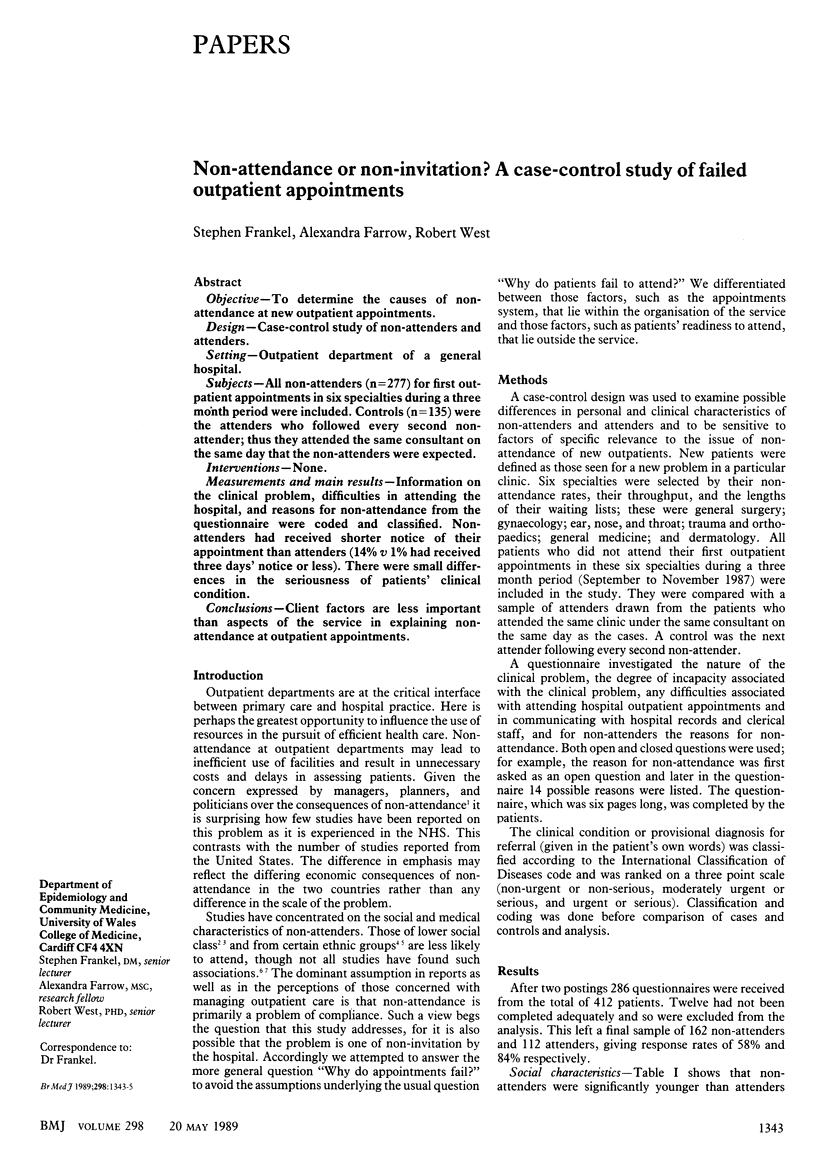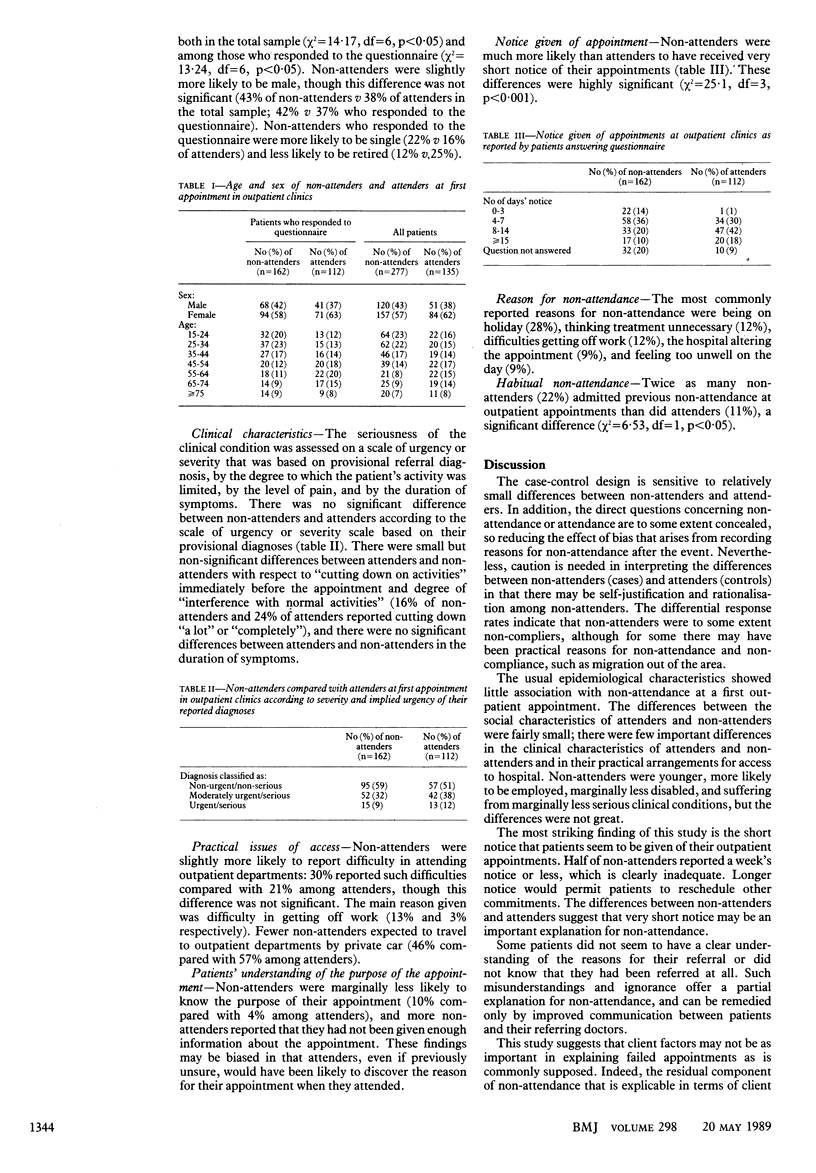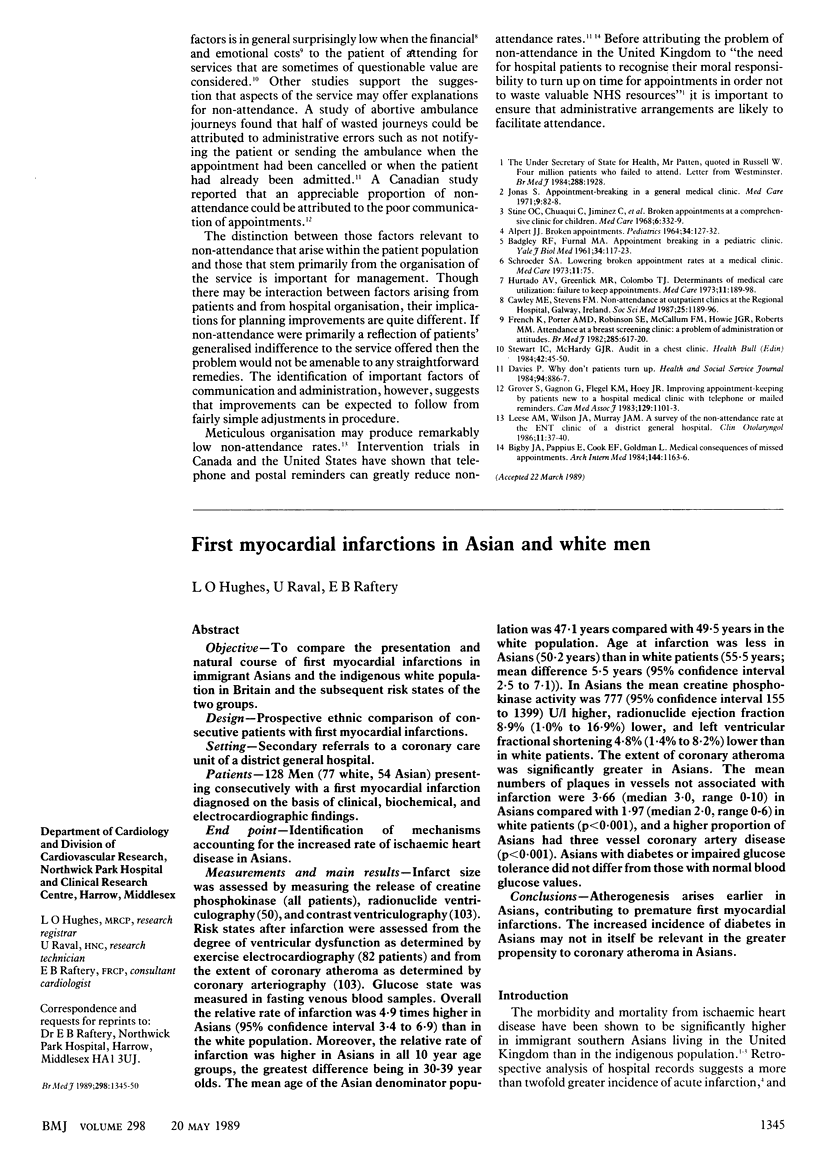Abstract
OBJECTIVE--To determine the causes of non-attendance at new outpatient appointments. DESIGN--Case-control study of non-attenders and attenders. SETTING--Outpatient department of a general hospital. SUBJECTS--All non-attenders (n = 277) for first outpatient appointments in six specialties during a three month period were included. Controls (n = 135) were the attenders who followed every second non-attender; thus they attended the same consultant on the same day that the non-attenders were expected. INTERVENTIONS--None. MEASUREMENTS AND MAIN RESULTS--Information on the clinical problem, difficulties in attending the hospital, and reasons for non-attendance from the questionnaire were coded and classified. Non-attenders had received shorter notice of their appointment than attenders (14% v 1% had received three days' notice or less). There were small differences in the seriousness of patients' clinical condition. CONCLUSIONS--Client factors are less important than aspects of the service in explaining non-attendance at outpatient appointments.
Full text
PDF


Selected References
These references are in PubMed. This may not be the complete list of references from this article.
- ALPERT J. J. BROKEN APPOINTMENTS. Pediatrics. 1964 Jul;34:127–132. [PubMed] [Google Scholar]
- BADGLEY R. F., FURNAL M. A. Appointment breaking in a pediatric clinic. Yale J Biol Med. 1961 Oct;34:117–123. [PMC free article] [PubMed] [Google Scholar]
- Bigby J. A., Pappius E., Cook E. F., Goldman L. Medical consequences of missed appointments. Arch Intern Med. 1984 Jun;144(6):1163–1166. [PubMed] [Google Scholar]
- Cawley M. E., Stevens F. M. Non-attendance at outpatient clinics at the Regional Hospital, Galway, Ireland. Soc Sci Med. 1987;25(11):1189–1196. doi: 10.1016/0277-9536(87)90365-0. [DOI] [PubMed] [Google Scholar]
- Davies P. Why don't patients turn up? Health Soc Serv J. 1984 Jul 26;94(4907):886–887. [PubMed] [Google Scholar]
- French K., Porter A. M., Robinson S. E., McCallum F. M., Howie J. G., Roberts M. M. Attendance at a breast screening clinic: a problem of administration or attitudes. 1982 Aug 28-Sep 4Br Med J (Clin Res Ed) 285(6342):617–620. doi: 10.1136/bmj.285.6342.617. [DOI] [PMC free article] [PubMed] [Google Scholar]
- Grover S., Gagnon G., Flegel K. M., Hoey J. R. Improving appointment-keeping by patients new to a hospital medical clinic with telephone or mailed reminders. Can Med Assoc J. 1983 Nov 15;129(10):1101–1103. [PMC free article] [PubMed] [Google Scholar]
- Hurtado A. V., Greenlick M. R., Colombo T. J. Determinants of medical care utilization. Failure to keep appointments. Med Care. 1973 May-Jun;11(6):189–198. doi: 10.1097/00005650-197305000-00002. [DOI] [PubMed] [Google Scholar]
- Jonas S. Appointment-breaking in a general medical clinic. Med Care. 1971 Jan-Feb;9(1):82–88. doi: 10.1097/00005650-197101000-00009. [DOI] [PubMed] [Google Scholar]
- Leese A. M., Wilson J. A., Murray J. A. A survey of the non-attendance rate at the ENT clinic of a district general hospital. Clin Otolaryngol Allied Sci. 1986 Feb;11(1):37–40. doi: 10.1111/j.1365-2273.1986.tb00104.x. [DOI] [PubMed] [Google Scholar]
- Schroeder S. A. Lowering broken appointment rates at a medical clinic. Med Care. 1973 Jan-Feb;11(1):75–78. [PubMed] [Google Scholar]
- Stewart I. C., McHardy G. J. Audit in a chest clinic. Health Bull (Edinb) 1984 Jan;42(1):45–50. [PubMed] [Google Scholar]


